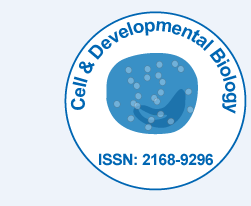
Cell & Developmental Biology
Open Access
ISSN: 2168-9296

ISSN: 2168-9296
Perspective - (2023)Volume 12, Issue 1
Cancer remains one of the most significant health challenges of our time, affecting millions of lives worldwide. Within the complex landscape of cancer, understanding the behavior and characteristics of cancer cells is crucial for developing effective treatments. This article delves into the intricacies of cancer cells, shedding light on their formation, behavior, and the latest advancements in targeted therapies, aiming to revolutionize cancer treatment.
Origin and formation of cancer cells
Cancer cells originate from normal cells within the body, undergoing genetic mutations that alter their behavior and growth patterns. These mutations can occur spontaneously or be triggered by external factors such as exposure to carcinogens, genetic predispositions, or lifestyle choices. Once a normal cell acquires mutations in key genes, it begins to divide uncontrollably, leading to the formation of a tumor.
Properties and behavior of cancer cells
Cancer cells possess distinctive characteristics that differentiate them from healthy cells. One of the defining features is their ability to evade programmed cell death, known as apoptosis, which ensures the removal of damaged or abnormal cells from the body. Additionally, cancer cells can induce angiogenesis, the formation of new blood vessels, ensuring a constant supply of nutrients and oxygen to support their uncontrolled growth.
Another hallmark of cancer cells is their ability to metastasize. Metastasis refers to the process by which cancer cells break away from the primary tumor, enter the bloodstream or lymphatic system, and establish secondary tumors in distant organs. This metastatic spread is responsible for the majority of cancer-related deaths, making it a significant focus for researchers and clinicians. Traditionally, cancer treatment has relied on broadspectrum approaches such as chemotherapy and radiation therapy, which can cause significant damage to healthy cells. However, recent advancements in targeted therapies offer a more precise and personalized approach to cancer treatment.
Targeted therapies exploit specific vulnerabilities present in cancer cells, such as mutations in key genes or the overexpression of certain proteins. By targeting these specific molecular alterations, these therapies aim to inhibit the growth and survival of cancer cells while sparing healthy cells. One notable example of targeted therapy is the development of tyrosine kinase inhibitors (TKIs) for the treatment of various cancers. TKIs work by blocking specific enzymes involved in cell signaling pathways that promote cancer growth. These inhibitors have shown remarkable success in extending survival rates and improving the quality of life for patients with certain types of cancer. Another ground breaking approach in cancer treatment is immunotherapy, which harnesses the power of the immune system to recognize and destroy cancer cells.
The immune system has the remarkable ability to distinguish between normal and abnormal cells, including cancer cells. Immunotherapies, such as immune checkpoint inhibitors, enhance the immune response by blocking proteins that prevent immune cells from recognizing and attacking cancer cells. This approach has shown remarkable success, particularly in treating melanoma, lung cancer, and certain types of lymphoma.
Moreover, the use of Chimeric Antigen Receptor (CAR) T-cell therapy has revolutionized the treatment of blood cancers, providing targeted and highly effective treatments for patients who previously had limited options. Precision medicine, on the other hand, seeks to tailor cancer treatment strategies to the individual characteristics of each patient. This approach takes into account the genetic makeup of the tumor, the patient's overall health, and lifestyle factors to optimize treatment outcomes. By identifying specific genetic alterations within cancer cells, clinicians can select the most appropriate targeted therapies or clinical trials for each patient, maximizing the chances of successful treatment.
The study of cancer cells has brought us closer to unraveling the mysteries of this complex disease. As our knowledge grows, so does our ability to develop more effective and precise treatment strategies. Targeted therapies, immunotherapies, and emerging frontiers like epigenetics and precision medicine offer hope for improved outcomes and better quality of life for cancer patients.
By continuing to invest in research and innovation, we can bring us closer to a future where cancer is no longer a formidable foe, but a conquerable challenge.
Citation: Gao K (2023) Brief note on Origin and Formation of Cancer Cells. Cell Dev Biol. 12:266
Received: 02-Jan-2023, Manuscript No. CDB-23-25874; Editor assigned: 04-Jan-2023, Pre QC No. CDB-23-25874 (PQ); Reviewed: 11-Jan-2023, QC No. CDB-23-25874; Revised: 18-Jan-2023, Manuscript No. CDB-23-25874(R); Published: 25-Jan-2023 , DOI: 10.35248/2168-9296.23.12.266
Copyright: © 2023 Gao K. This is an open-access article distributed under the terms of the Creative Commons Attribution License, which permits unrestricted use, distribution and reproduction in any medium, provided the original author and source are credited.